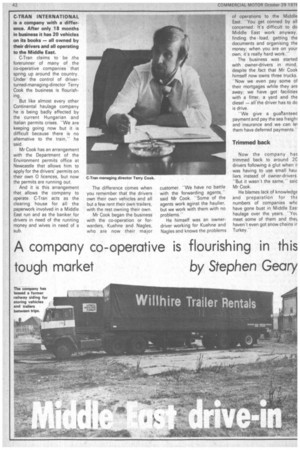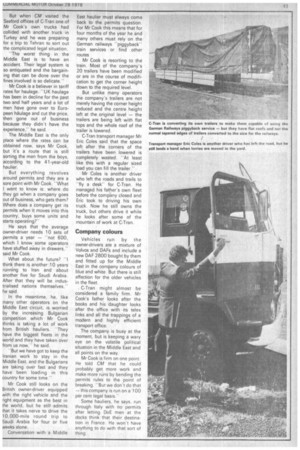A company co-operative is flourishing in this
Page 64

Page 65

If you've noticed an error in this article please click here to report it so we can fix it.
tough market by Stephen Geary
C-TRAN INTERNATIONAL is a company with a difference. After only 18 months in business it has 20 vehicles on its books — all owned by their drivers and all operating to the Middle East.
C-Tran claims to be the forerunner of many of the co-operative companies that spring up around the country Under the control of driverturned-managing-director Terry Cook the business is flourishing.
But like almost every other Continental haulage company he is being badly affected by the current Hungarian and Italian permits crises. "We are keeping going now but it is difficult because there is no alternative to the train," he said.
Mr Cook has an arrangement with the Department of the Environment permits office at Newcastle that allows him to apply for the drivers' permits on their own 0 licences, but now the permits are running out.
And it is this arrangement that allows the company to operate. C-Tran acts as the clearing house for all the paperwork involved in a Middle East run and as the banker for drivers in need of the running money and wives in need of a sub. The difference comes when you remember that the drivers own their own vehicles and all but a few rent their own trailers, with the rest owning their own.
Mr Cook began the business with the co-operation or forwarders, Kuehne and Nagles, who are now their major customer. "We have no battle with the forwarding agents," said Mr Cook, "Some of the agents work aginst the haulier, but we work with them with no problems."
He himself was an ownerdriver working for Kuehne and Nagles and knows the problems of operations to the Middle East. "You get conned by all concerned, it's difficult to do Middle East work anyway, finding the load, getting the documents and organising the money: when you are on your own, it's really hard work."' The business was started with owner-drivers in mind, despite the fact that Mr Cook himself now owns three trucks "Now we even pay some of their mortgages while they are away; we have got facilities with a fitter, a yard and the diesel — all the driver has to do is drive.
"We give a guaTanteec payment and pay the sea freighi and insurance and we can lel them have deferred payments."'
Trimmed back Now the company hat trimmed back to around 2C drivers following a glut when ii was having to use small haft liers instead of owner-drivers -But it wasn't the same," saic Mr Cook.
He blames lack of knowledge and preparation for the numbers of companies whc have gone bust in Middle Easi haulage over the years.."YoL meet some of them and they haven't even got snow chains ir Turkey."
But when CM visited the Seaford offices of C-Iran one of Mr Cook's own trucks had collided with another truck in Turkey and he was preparing for a trip to Tehran to sort out the complicated legal situation.
"The worst thing in the Middle East is to have an accident. Their legal system is so antiquated and the bargaining that can be done over the fines involved is so delicate.
Mr Cook is a believer in tariff rates for haulage. "UK haulage has been in decline for the past two and half years and a lot of men have gone over to European haulage and cut the price, then gone out of business because they didn't have the experience," he said.
The Middle East is the only place where the rates can be obtained now, says Mr Cook, but it's a route that is still sorting the men from the boys, according to the 41-year-old haulier_ But everything revolves around permits and they are a sore point with Mr Cook. "What I want to know is where do they go when a company goes out of business, who gets them? Where does a company get its permits when it moves into this country, buys some units and starts operating?"
He says that the average owner-driver needs 10 sets of permits a year — "not 600, which I know. some operators have stuffed away in drawers," said Mr Cook What about the future? -I think there is another 10 years running to Iran and about another five for Saudi Arabia. After that they will be industrialised nations themselves," he said.
In the meantime, he, like many other operators on the Middle East circuit, is worried by the increasing Bulgarian competition which Mr Cook thinks is taking a lot of work from British hauliers. "They have the biggest fleets in the world and they have taken Over from us now,' he said "But we have got to keep the Iranian work to stay in the Middle East, and the Bulgarians are taking over fast and they have been loading in this country for some time."
Mr Cook still looks on the British owner-driver equipped NO the right vehicle and the right equipment as the best in the world, but he still admits chat it takes nerve to drive the 10,000-mile round trip to Saudi Arabia for four or five Neeks alone.
Conversation with a Middle East haulier must always come back to the permits question. For Mr Cook this means that for four months of the year he and many others must rely on the German railways "piggyback" train services or find other routes Mr Cook is resorting to the train. Most of the company's 20 trailers have been modified or are in the course of modification to get the corner height down to the required level.
But unlike many operators the company's trailers are not merely having the corner height reduced and the centre height left at the original level — the trailers are being left with flat tops and the whole roof of the trailer is lowered.
C-Tran transport manager Mr Eric Coles said that the space left after the corners of the trailers have been lowered is completely wasted. -At least like this with a regular sized load you can fill the trailer."
Mr Coles is another driver who left the roads and trails to "fly a desk" for C-Tran. He managed his father's own fleet before the company closed and Eric took to driving his own truck. Now he still owns the truck, but others drive it while he looks after some of the mountain of work at C-Tran.
Company colours
Vehicles run by the owner-drivers are a mixture of Volvos and DAFs and include a new DAF 2800 bought by them and fitted up for the Middle East in the company colours of blue and white. But there is still affection for the older vehicles in the fleet.
C-Iran might almost be considered a family firm. Mr Cook's father looks after the books and his daughter looks after the office with its telex links and all the trappings of a modern and highly efficient transport office.
The company is busy at the Moment, but is keeping a wary eye on the volatile political situation in the Middle East and all points on the way.
Mr Cook is firm on one point He told CM that he could probably get more work and make more runs by bending the permits rules to the point of breaking. -But we don't do that -this company is run on a 100 per cent legal basis."
Some hauliers, he says, run through Italy with no permits after letting DoE men at the docks think that their destination in rrance. He won't have anything to do with that sort of thing.








































































































